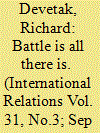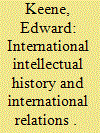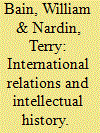| Srl | Item |
| 1 |
ID:
155787


|
|
|
|
|
| Summary/Abstract |
There is an expectation today that International Relations (IR) theory ought to engage with philosophy as a meta-knowledge capable of grounding and legitimizing knowledge claims in the discipline. Two assumptions seem to lie behind this expectation: first, that only philosophy can supply the necessary meta-theoretical grounding needed; second, that theory is inherently a philosophical register of knowledge. This article treats these assumptions with scepticism. While not denying philosophy’s contribution to IR theory, the article makes the case for contextual intellectual history as an alternative mode of political and international theory. It seeks to shed light on the ‘philosophization of IR’ by depicting the broad contours of the historical and continuing rivalry between philosophy and history in the humanities and social sciences and, by reference to Machiavelli and Renaissance humanism, reminding the discipline of IR of the value of studying politics and international relations in a historical mode.
|
|
|
|
|
|
|
|
|
|
|
|
|
|
|
|
| 2 |
ID:
155791


|
|
|
|
|
| Summary/Abstract |
This article reviews contextualist methods in intellectual history and discusses some of the specific challenges involved in their application to the study of International Relations (IR) and hence international intellectual history. While the broad thrust of these developments has been highly positive, the article argues that a distinction between classic and lesser works is a crucial part of the apparatus of the contextualist approach, which poses a problem in IR, where the idea of an established canon of great works has historically been less well developed than in the study of Political Theory or Law. As a result, the move towards contextualist methods of interpretation can force authors to restrict their focus onto a newly conceived, and somewhat narrow, canon, with a strongly political and legal flavour. The eclectic range of earlier, albeit less methodologically sophisticated, histories offer considerable resources for defining the scope of new empirical enquiries in international intellectual history, and the article concentrates on early modern journalism as an example of this opportunity.
|
|
|
|
|
|
|
|
|
|
|
|
|
|
|
|
| 3 |
ID:
155784


|
|
|
|
|
| Summary/Abstract |
The history of international thought has traditionally focused on a limited number of canonical texts. Such an approach now seems both naive and parochial. International Relations scholars often read their own ideas into these texts instead of getting ideas from them – ideas that if properly understood have the potential to undermine theirs. By ignoring non-canonical texts, we overlook resources that are not only necessary to establish the historical contexts of canonical writings but that can also help theorists of International Relations to understand their subject better. Judgements of what is and is not canonical are in any case themselves context-bound and contestable. Intellectual history can help us understand how the International Relations canon was constructed and for what purposes. It can also counter the abstractions of theory by reminding us not only that theories are abstractions from the activities of people living in particular times and places but also that our own theories are embedded in historicity. In these and other ways, paying attention to intellectual history expands the repertoire of ideas on which International Relations theorists can draw and against which they can measure their conclusions. The articles in this issue illustrate these points in relation to a wide range of texts and contexts. They suggest that whether one approaches international relations from the angle of description, explanation, policy or ethics, knowing how past thinkers have understood the subject can lead to better informed and more robust scholarship.
|
|
|
|
|
|
|
|
|
|
|
|
|
|
|
|